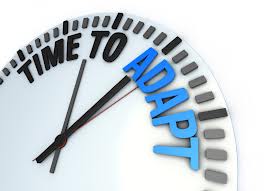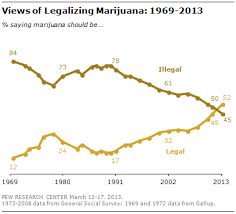 Welcome to O.D. Fridays at DonorDreams blog. Every Friday for the foreseeable future we will be looking at posts from John Greco’s blog called “johnponders ~ about life at work, mostly” and applying his organizational development messages to the non-profit community.
Welcome to O.D. Fridays at DonorDreams blog. Every Friday for the foreseeable future we will be looking at posts from John Greco’s blog called “johnponders ~ about life at work, mostly” and applying his organizational development messages to the non-profit community.
In a post titled “Survival Is Not Mandatory,” John talks about our always changing world and workplaces and how we need to evolve in order to remain viable and relevant. His conclusions are simple: 1) Evolve or die and 2) Survival is not mandatory.
Sometimes timing is everything. When I read this blog post, I was on the treadmill with my new iPad with Morning Joe on the television in the background. The television talking heads were droning on about marijuana legalization and they flashed the following graphic on the screen:
My first reaction was “Huh, it’s interesting that the opinion lines recently crisscrossed.” My second reaction was “Hmmmm, where have I seen another graphic like that?” And within moments, I remembered that the other similar graphic was this one about same-sex marriage:
These two thoughts were colliding in my mind as my feet trudged along on the treadmill, and then my eyes went back to my iPad and John’s blog post about change. My first thought was “What is driving all of this immediate change so quickly?” And my second thought was “I wonder what implications these trends may have for non-profit organizations, fundraising, resource development and philanthropy?” Almost immediately, I remembered seeing the following chart in a Giving USA Spotlight newsletter:
It was at this point I realized the meteor has hit our planet, the weather patterns are changing, and change is starting to happen rapidly. The change we’re experiencing in our society is exponential.
If you are scratching your head and find yourself saying “HUH,” then I encourage you to look more carefully at the previous graphic. The oldest members of the Millennial generation are already in their 30s. Combine this with the fact that the Millennial generation is almost as large as the Baby Boomer generation (e.g. 79 million Boomers vs. 75 million Millennials) and then factor in the 51 million GenXers, and you have the recipe for rapid change.
Still not convinced? The consider the fact that every day for the next 19 years it is estimated that 10,000 Baby Boomers will retire EVERY DAY. In 2014, Millennials will make up 26% of the workplace and this number will soar to 36% by 2020.
Let’s face the grim realities here:
- Every single day there are a number of Silent/Greatest generation and Baby Boomer generation individuals who are dying and retiring.
- Every single day there are a number of Millennials who reach voting age and enter the workforce.
LOL . . . I am reminded of that famous quotation by Ross Perot speaking to that “giant sucking sound”. In this instance, I don’t think we’re talking about NAFTA. In this example, that giant sucking sound is the vacuum being filled by Millennials.
So, what is the end result? What does all of this mean for non-profit organizations? Fundraising? Philanthropy?
Well, I am not a fortune-teller, but the following thoughts have crossed my mind:
- The workplace characteristics for non-profit organizations will change quickly.
- The donor profile will change quickly.
- The client profile will also change quickly.
I suspect most “best practices” won’t change (e.g. face-to-face solicitation is the most effective way to secure donations), but I can imagine that strategies and tactics need to adapt and evolve. For example . . .
- We know that once a donor retires their charitable giving habits seem to change. With 10,000 Baby Boomers retiring every day, I suspect resource development plans need to evolve because at this point in time Boomers make up the bulk of most agencies donor databases. (Did you know that 69% of Boomers donate to charity compared to 33% of Millennials? Source: Center on Philanthropy Panel Study)
- We know that direct mail is effective with Baby Boomers much more so than it is with Millennials.
- I suspect that fewer Millennials physically own checkbooks than their Baby Boomer counterparts.
(I wonder how eBanking impacts traditional charitable giving systems?) - We know that Millennials volunteer at higher rates than any other generation.
John ends his post by simply stating “But survival is not mandatory.” This revelation is striking because it causes me to wonder: Which non-profits are going to adapt? Which agencies are going to die? How will those who survive evolve and adapt? When will that process start? When will resource development plans start to reflect these changes? Who will step up and lead on these issues?
If you are feeling overwhelmed, I can appreciate that, but paralysis is the enemy of evolution and adapting.
My best suggestion to those of you who don’t know what to do or how to proceed is commit yourself to learning more. Click here to read a great publication titled “Charitable Giving and the Millennial Generation” from the Giving USA Foundation at The Center of Philanthropy at Indiana University. There are a lot of great “AH-HA” moments in this publication. Hopefully, it will get you and your organization pointed in the right direction.
As many of you know, I am a GenXer. As I finish this blog post, I suddenly have a song running through my head and I can’t get it to stop. Upon a little reflection, I now realize that this song is my generation’s anthem and characterizes our lifelong struggle with Baby Boomers and Millennials. Click here if you want to get inside my head and enjoy what I am sure will become my generation’s rally cry. 😉
Please scroll down to the comment box and weigh-in with any thoughts you may have about the questions I posed a few paragraphs ago. We can all learn from each other.
Here’s to your health!
Erik Anderson
Founder & President, The Healthy Non-Profit LLC
www.thehealthynonprofit.com
erik@thehealthynonprofit.com
http://twitter.com/#!/eanderson847
http://www.facebook.com/eanderson847
http://www.linkedin.com/in/erikanderson847




3 comments